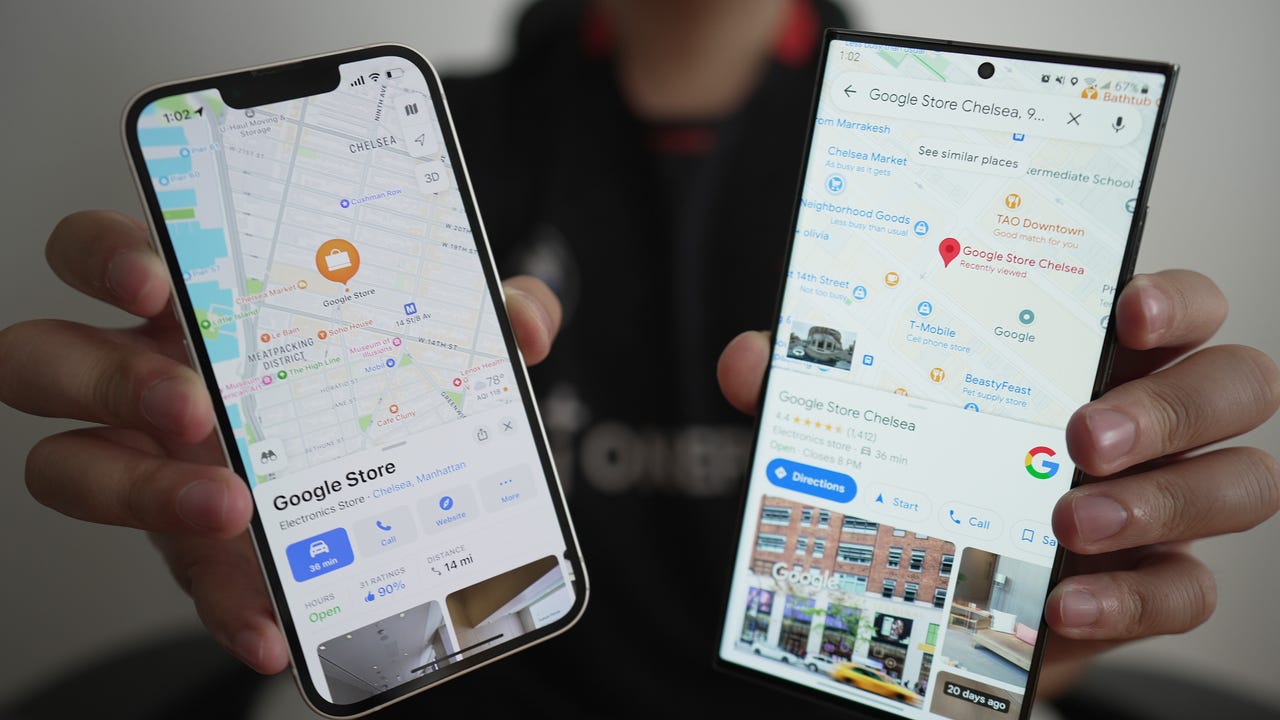Apple Maps vs. Google Maps: iPhone users are switching back, but which is better?

A recent report from Wall Street Journal sparked an interesting conversation about Apple Maps versus Google Maps, particularly with how far the former has come since its underwhelming debut back in 2012.
You may even remember Apple CEO, Tim Cook, making a public apology for Apple Maps’ lackluster experience at the time, recommending users download competing navigation services instead.
Also: Apple sneaks into the AI chatbot race with ‘Apple GPT’
Times have changed. More than a decade (and numerous updates) later, Apple Maps is gaining on its biggest competitor, Google Maps, offering a similar, if not better, user experience, begging the question, which app should you use?
To help you decide, I’ve listed the key differences between the two below, comparing the latest app versions and exclusive features.
You should use Apple Maps if…
1. You’d prefer navigation that’s easier on the eyes
One of the primary reasons why users are switching back to Apple Maps from Google Maps, as suggested by the WSJ article, is the cleaner user interface. Putting the search boxes and settings menus aside, what positions Apple Maps ahead is how much easier the app is on the eyes.
Also: Your next iPhone may feature Apple’s biggest camera upgrade ever
For how much information we’re processing when using a map, Apple’s “less is more” approach benefits users who just want to find street names and general directions, and not be obtruded by every restaurant and building name on the block (which is the case with Google Maps, for better or worse).
2. You’ve invested in other Apple products
It should come as no surprise that Apple Maps works best with other Apple products. Over the years, the company has embedded the service across its product portfolio, from AirTags and the FindMy network to CarPlay to the Apple Watch.
In fact, if you’re a Watch user, you may already be accustomed to synchronized directions when Apple Maps is open and you’re on the road. The benefit of having the watch vibrate ahead of turns and glanceable directions on your wrist may sell you on Apple Maps alone.
3. Privacy is a priority
If privacy is one of your concerns when using location-based apps, you’ll feel better knowing that Apple Maps stores search and location data locally, unless you opt-in to data-sharing when backing it up to iCloud. Personalized data is also stored on device, compared to Google Maps, which collects and leverages it to make travel and restaurant suggestions. You can learn more about Apple’s privacy and image collection policy here.
You should use Google Maps if…
1. You’re on Android (or just prefer the flexibility)
If there’s one definitive area where Google Maps absolutely leaps over its Apple counterpart, it’s app compatibility. Google Maps is available on iOS, Android, Mac, Windows, and Chrome devices, whereas Apple Maps is restricted to Apple platforms only. That makes the Google service much more accessible.
Also: The Apple products you shouldn’t buy this month
The fact that many iPhone users use Google Maps, even though Apple Maps is preloaded on devices, is very telling.
2. Better travel calculations matter to you
Besides having a greater database of geographic data, Google Maps is technically more reliable when calculating commutes and travel plans. For example, you’re able to set departure and arrival times to find the best navigation route for you.
Tapping into restaurants, bars, and even bus routes also presents you with information on how busy the place is, which is especially valuable when you have a preference for crowdedness or want a seat on the evening bus ride home.
Also: How to clear the cache on your Android phone or tablet (and why you should)
Google Maps also integrates the company’s heavily crowdsourced reviews system, so you can scan customer testimonials and photos and videos of places as you’re planning. Apple Maps has a similar function, but it’s sourced by Yelp and redirects you to the app for more information.
3. You can’t wait for offline maps on iOS 17
With the upcoming iOS 17 update, Apple Maps will finally support offline maps, a feature that already exists on Google Maps, and is arguably the main reason why iPhone users switched over in the first place. As the name suggests, offline maps allow users to download areas of data so that they can be accessed when there’s no internet or the signal is weak.
For travelers, using offline maps will also save you from roaming charges to your cellular data.
Alternative to consider
BEST MAPS ALTERNATIVE
Waze
If navigation is your priority, Waze offers the best real-time traffic updates, including nearby police, speed cameras, and accidents.
For all the latest Technology News Click Here
For the latest news and updates, follow us on Google News.
